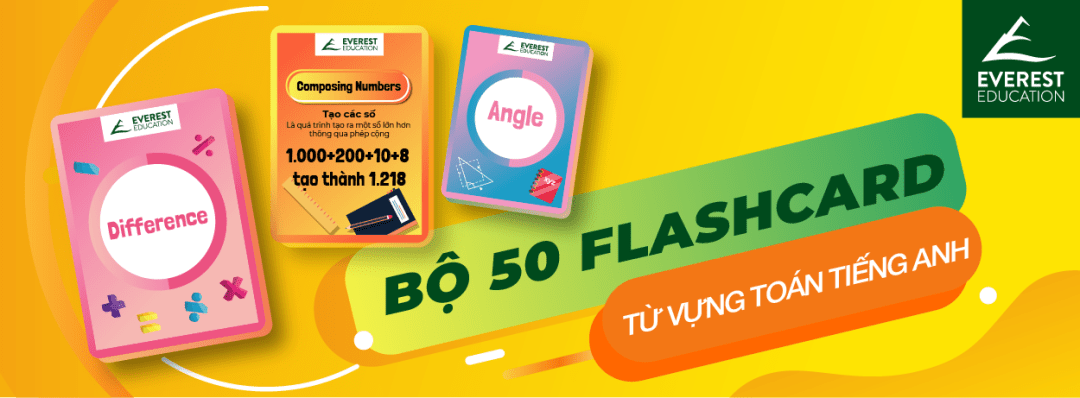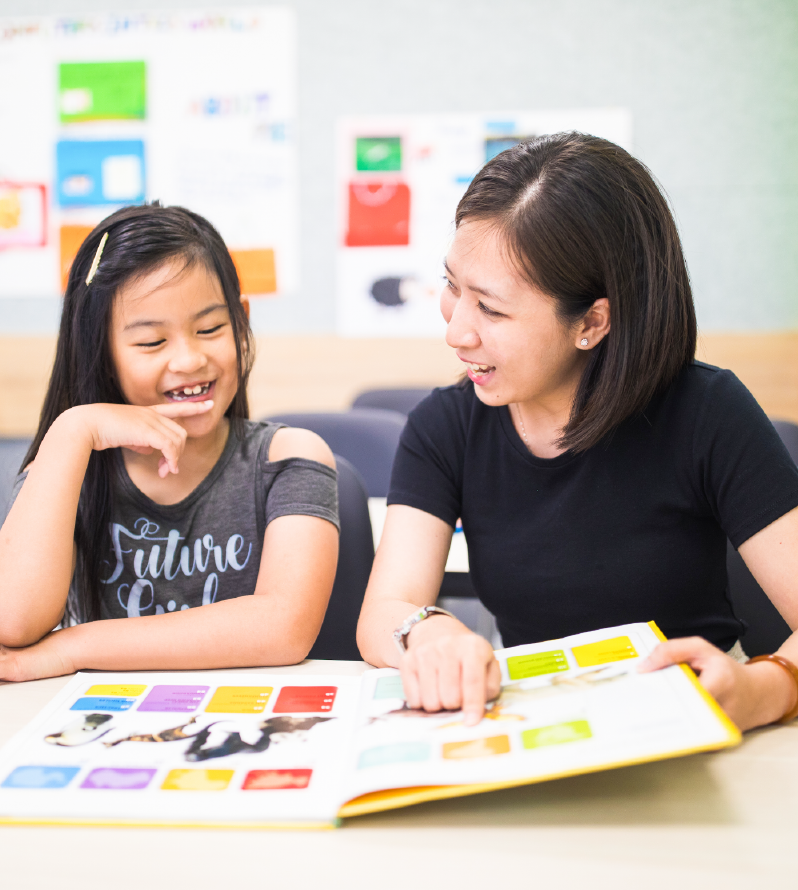In recent decades, with the ongoing wave of globalization and the increasing numbers of international and bilingual schools across our country, learning Math in English has been an emerging trend among middle-class and dual-income families. The ability to do Math in English not only enables students to participate in international Math competitions, such as IMO (International Mathematical Olympiad), SASMO (Singapore and Asian Schools Math Olympiads), IKMC (International Kangaroo Mathematics Contest)… but also get them ready for assessment tests to gifted schools, and those standardized tests like SAT, ACT for college applications.
Even if students don’t have a plan to study abroad, having a good knowledge of Math in English still allows them to take full advantage of online resources out there. The internet nowadays provides us with tons of free, useful, and enriching Math learning sites, applications, resources from renowned universities, and other educational institutions. The only problem is: they are all in English.
As one of the pioneering learning centers conducting Math classes in English, and having years of experience teaching Math for international students, there were so many times we saw a student, who was proficient in a specific Math skill but still got problems incorrectly. Most of the time, it was not the actual Math that was causing students issues. They were struggling because they were not fluent in the language of Math.
To help children learn Math in a language which is not their first language, teachers and parents need to assess whether this is desirable, and attempt to find meaningful, effective ways in which they are able to correctly use Mathematical terms and apply them to problem solving.
Since scientists acknowledge that the aptitude for developing Mathematical skills is directly connected to literacy, parents should first equip young children with a strong foundation of basic Math concepts.
In this article, we give-away a set of Math flashcards with detailed guidance for parents to incorporate Math vocabulary lessons into your daily conversation with your child, to help them build a strong knowledge of the vocabulary of Math.
Why is Math Vocabulary Important?
Learning math is like learning a foreign language. In order to be successful in Math, students must become fluent with the vocabulary. Research has shown that “Mathematics presents challenging reading because this content area has more concepts per word, per sentence, and per paragraph than any other area” (Harmon, Hedrick, & Wood, 2005, p. 266). We see this often with the trouble so many students have in approaching word problems!
For example, students who were fluent in division facts can still be confused when asked to “compare the product of the expression on the left with the quotient of the expression on the right using the correct mathematical symbols.” Even simple equations such as “5 + 5” or “6 – 2” may cause students to second guess themselves when instead of being told to simply add or subtract, they are instead asked to “compute to find the sum” or “calculate the equation to identify the difference.”
Words like odd, even, product, positive, negative, power, and difference… have different meanings and connotations from the way they are used in everyday conversations. That’s why we should provide consistent opportunities for students to practice the Math vocabulary words verbally, in writing, and in the context of Math problems. The good news is that learning Math vocabulary can actually be fun for elementary students if you incorporate engaging games and activities into your weekly Math routines.
How to use flashcards to teach kids Math vocabulary
We tend to think of Math as all numbers, but there’s actually quite a bit of language learning that goes on in and outside the Math class, too. If students can put “a name with a face”, they can start to really understand and translate Mathematical terminology into useful knowledge on their daily assignments. This then would correlate to better attitudes towards Math as well as better results.
To assist parents with this, Everest has compiled a set of 50 flashcards – for parents to practice with your child at home.
Our Math Flashcards are free to download, easy to use, and very flexible. The set consists of 50 basic Math terminologies any students need to know when they step into the world of Math in English. Each card has two features: one side is the word in English and the other is the definition demonstrated with clear graphics and explanation. Parents can print out as separate cards and run through them with your child every day to help them memorize the words.

How to use our Math Flashcards effectively:
- The first step in using flashcards effectively is to use them the right way and in the right environment:
- Sit comfortably facing your child.
- Arrange the flashcards in the order you would like to present them.
- Hold up the first card so your child can clearly see the front. Keep the back of the flashcard toward you so your child cannot see it.
- If necessary, read the front of the flashcard to your child. For example, you may read a Math word from the flashcard front. Count to three in your head. This will allow your child about three seconds to consider the question on the flashcard and think about her answers. Remember, the key is keeping things fun. The best kind of learning occurs when your child is having too much fun to realize how much she is learning.
- If your child gives a correct answer, place the correctly answered flashcard in a pile on your left.
- If your child gives an incorrect response or no response, tell them the correct answer and place these flashcards in a pile on your right side.
- After you have finished showing your child all of the flashcards, you may continue your flashcard teaching session by using the stack of incorrectly answered cards. Continue in the same manner, placing correctly answered flashcards on the left and incorrectly answered flashcards on the right.
- Once your child has mastered the full set of flashcards, practice them periodically to ensure your child remembers them.
 Pro tips:
Pro tips:
1. State Answers Out Loud
Maybe your child likes to run through the flashcards on their own. Maybe your child is shy or timid. However, speaking out loud can help your child memorize the math vocabs. This way your child is seeing the word, saying the word, and hearing it. Together, this will help your child make connections to remember these words each time.
2. Focus on Mastery
You can sift through a large stack of cards every day, but it’s going to end up being a waste of time.
Rather than spending time going over words that your child already knows, focus on ones that she hasn’t already mastered. One way to do this would be by creating two containers – one for the words your child has mastered, and the other for ones that she is still working on. As your child masters each word, move it to the mastery box. Then, your child can observe her progress while focusing on the facts that need to be mastered.
3. Keep things fun and stress-free
Adding to the mastery box may be encouraging, but children tend to lose motivation as the Math vocabs get harder and they know fewer words. As this happens, you can find ways to motivate your child to continue working hard by keeping the flashcard session fun and game-like.
For example, create a bingo card with answers. Then, hold up the math word. Have your child state the answer before finding the corresponding definition on the card. Of course, providing a prize or treat when your child gets a bingo could be a fun motivation, too!
Where learning meets joy
with friends and teachers who care
Think Outside the Math Flashcards
If flashcards aren’t working or your child needs a break, there are still other ways to practice Math vocabulary:
- Use children’s literature to teach Math
One of the best ways to naturally teach Math vocabulary is in the context of an engaging story. Children’s books are extremely effective tools for teaching Mathematics. They can spark students’ Math imaginations in ways that textbooks or workbooks don’t. Connecting Math to literature can boost confidence for children who love books but are wary of Math. And students who already love Math can learn to appreciate stories in an entirely new way. There’s a huge variety of books available that provide many opportunities for teaching Math lessons. Parents can check out these five great reads that incorporate math for kids of various ages – recommended by Tony Ngo – our Chairman and Co-founder of Everest Education. That’s how he sneaks in Math concepts into the reading time with his two children.
 Utilize Math in everyday life
Utilize Math in everyday life
Students need to apply the terms that they see in their Math textbook, workbook, and videos to the world around them. Studying fractions? Let your child measure out water into various cups. Is 1/4 smaller or larger than 1/3? How does the denominator change the value of the fraction? Try recreating this in real life and help your child learn to use Math in practical ways. You can also make a game of it and show your child that Math can be fun
We have put together a long list of super fun Math activities for your kids to help them develop a strong foundation in understanding Math, and enhance their interest in learning.
>>> Get more ideas from our previous article: Playful Math activities for your primary kids.





 Pro tips:
Pro tips:





 Utilize Math in everyday life
Utilize Math in everyday life







